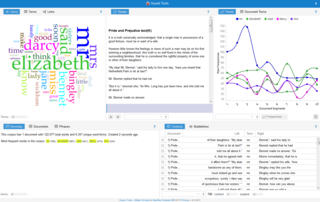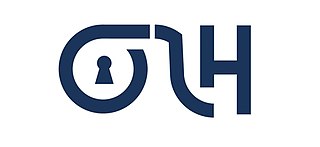See also
- Connexions, the open-source e-publishing platform
- List of university presses
| Parent company | Rice University |
|---|---|
| Status | defunct |
| Founded | 1985 (Original press) 2006 (Digital-only press) |
| Country of origin | United States |
| Headquarters location | Houston, Texas |
The Rice University Press was a publishing house, a division of Rice University. Founded in 1985, the original version of the press shut down in 1996. In 2006, the organization was re-launched as the first fully digital university press in the United States. [1] [2]
Under its digital publication model, manuscripts were solicited, reviewed, edited and resubmitted for final approval by an editorial board of prominent scholars, but the finished books were published free of charge via Connexions, an open-source e-publishing platform. The technology offered authors a way to use multimedia to craft dynamic scholarly arguments, and to publish on-demand original works in fields of study that were increasingly constrained by print publishing. [3] [4] [5]
In August 2010, Rice University confirmed that the press, despite being digital-only, had become too expensive to maintain. [6] Rice University Press shut down operations in September 2010. [2]

Publishing is the activity of making information, literature, music, software, and other content available to the public for sale or for free. Traditionally, the term refers to the creation and distribution of printed works, such as books, comic books, newspapers, and magazines. With the advent of digital information systems, the scope has expanded to include digital publishing such as ebooks, digital magazines, websites, social media, music, and video game publishing.

Open access (OA) is a set of principles and a range of practices through which research outputs are distributed online, free of access charges or other barriers. With open access strictly defined, or libre open access, barriers to copying or reuse are also reduced or removed by applying an open license for copyright.

Citizen journalism, also known as collaborative media, participatory journalism, democratic journalism, guerrilla journalism or street journalism, is based upon members of the community playing an active role in the process of collecting, reporting, analyzing, and disseminating news and information. Courtney C. Radsch defines citizen journalism "as an alternative and activist form of news gathering and reporting that functions outside mainstream media institutions, often as a response to shortcomings in the professional journalistic field, that uses similar journalistic practices but is driven by different objectives and ideals and relies on alternative sources of legitimacy than traditional or mainstream journalism". Jay Rosen offers a simpler definition: "When the people formerly known as the audience employ the press tools they have in their possession to inform one another." The underlying principle of citizen journalism is that ordinary people, not professional journalists, can be the main creators and distributors of news. Citizen journalism should not be confused with community journalism or civic journalism, both of which are practiced by professional journalists; collaborative journalism, which is the practice of professional and non-professional journalists working together; and social journalism, which denotes a digital publication with a hybrid of professional and non-professional journalism.
Source is a 3D game engine developed by Valve. It debuted as the successor to GoldSrc in 2004 with the releases of Half-Life: Source, Counter-Strike: Source, and Half-Life 2. It is most well-known for its usage by Valve, but the engine has been used both by small teams and individuals to create modifications of Valve games, and other studios creating distinct games, notably Troika Games' title Vampire: The Masquerade – Bloodlines. Valve continued to create incremental updates to the Source engine after its 2004 release, most of which coincided with games created by Valve. In the late 2010s, Valve created the Source 2 engine to replace Source, with it publicly debuting alongside Half-Life: Alyx. The Source engine is most well-known for its advancements in physics, AI, and graphics.

Open educational resources (OER) are teaching, learning, and research materials intentionally created and licensed to be free for the end user to own, share, and in most cases, modify. The term "OER" describes publicly accessible materials and resources for any user to use, re-mix, improve, and redistribute under some licenses. These are designed to reduce accessibility barriers by implementing best practices in teaching and to be adapted for local unique contexts.
Nature Portfolio is a division of the international scientific publishing company Springer Nature that publishes academic journals, magazines, online databases, and services in science and medicine.
Wharton School Press (WSP) is the book publishing arm of The Wharton School of the University of Pennsylvania. It was established in 2011 and is headquartered in Philadelphia, Pennsylvania.

Digital humanities (DH) is an area of scholarly activity at the intersection of computing or digital technologies and the disciplines of the humanities. It includes the systematic use of digital resources in the humanities, as well as the analysis of their application. DH can be defined as new ways of doing scholarship that involve collaborative, transdisciplinary, and computationally engaged research, teaching, and publishing. It brings digital tools and methods to the study of the humanities with the recognition that the printed word is no longer the main medium for knowledge production and distribution.

Kerala Sasthra Sahithya Parishad (KSSP) (lit. 'Kerala Science Literature Movement') is a prominent science and literature organization based in the Indian state of Kerala. It was founded in 1962 with the aim of promoting scientific temper, rational thinking, and a scientific approach to societal issues. The organization has played a significant role in popularizing science and scientific knowledge among the general public, particularly in the Malayalam-speaking region.
OpenStax CNX, formerly called Connexions, is a global repository of educational content provided by volunteers. The open source platform is provided and maintained by OpenStax, which is based at Rice University. The collection is available free of charge, can be remixed and edited, and is available for download in various digital formats.

Project MUSE, a non-profit collaboration between libraries and publishers, is an online database of peer-reviewed academic journals and electronic books. Project MUSE contains digital humanities and social science content from some 400 university presses and scholarly societies around the world. It is an aggregator of digital versions of academic journals, all of which are free of digital rights management (DRM). It operates as a third-party acquisition service like EBSCO, JSTOR, OverDrive, and ProQuest.

An online newspaper is the online version of a newspaper, either as a stand-alone publication or as the online version of a printed periodical.
The University of Michigan Press is a new university press (NUP) that is a part of Michigan Publishing at the University of Michigan Library. It publishes 170 new titles each year in the humanities and social sciences. Titles from the press have earned numerous awards, including Lambda Literary Awards, the PEN/Faulkner Award, the Joe A. Callaway Award, and the Nautilus Book Award. The press has published works by authors who have been awarded the Pulitzer Prize, the National Humanities Medal and the Nobel Prize in Economics.
The University of Scranton Press was the university press of the University of Scranton, headquartered on its campus in Scranton, Pennsylvania. The press published more than 200 books and other publications between 1988 and 2010. The majority of the University of Scranton Press' catalog are scholarly works dealing with religious issues, such Catholicism, Judaism and the Jesuit tradition, as well as regional issues specifically related to Northeastern Pennsylvania. The University of Scranton Press published approximately 24 publications annually at its height.

Free content, libre content, libre information, or free information is any kind of mind work, such as a work of art, a book, a software program, or any other creative content that meets the definition of a free cultural work, meaning "works or expressions which can be freely studied, applied, copied and/or modified, by anyone, for any purpose", including, in some cases, commercial purposes. Free content encompasses all works in the public domain and also those copyrighted works whose licenses honor and uphold the definition of free cultural work.
An open textbook is a textbook licensed under an open license, and made available online to be freely used by students, teachers and members of the public. Many open textbooks are distributed in either print, e-book, or audio formats that may be downloaded or purchased at little or no cost.

Richard G. Baraniuk is the C. Sidney Burrus Professor of Electrical and Computer Engineering at Rice University and the Founder and Director of the open education initiative OpenStax.
AustLit: The Australian Literature Resource, is the national bio-bibliographical database of Australian Literature. It is an internet-based, non-profit collaboration between researchers and librarians from Australian universities, housed at The University of Queensland (UQ). The AustLit database comprises a comprehensive bio-bibliographical record of Australian storytelling and print cultures with over 1 million individual 'work' records, and over 75 discrete research projects.
OpenStax is a nonprofit educational technology initiative based at Rice University. Since 2012, OpenStax has created peer-reviewed, openly-licensed textbooks, which are available in free digital formats and for a low cost in print. Most books are also available in Kindle versions on Amazon.com and in the iBooks Store. OpenStax's first textbook was College Physics, which was published online, in print, and in iBooks in 2012. OpenStax launched OpenStax Tutor Beta in June 2017, adaptive courseware based on cognitive science principles, machine learning, and OpenStax content. However, it was announced in October 2022 that Tutor was being discontinued.

The Open Library of Humanities is a nonprofit, diamond open access publisher in the humanities and social sciences founded by Martin Paul Eve and Caroline Edwards. Founded in 2015, OLH publishes 27 scholarly journals as of 2022, including a mega journal, also called Open Library of Humanities, which was modeled on PLOS but not affiliated with it.